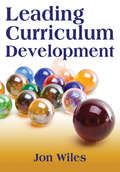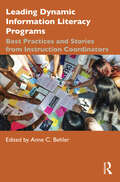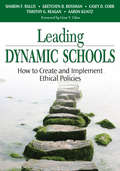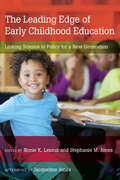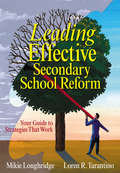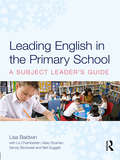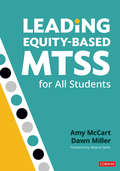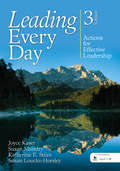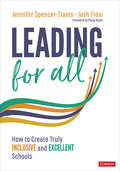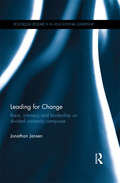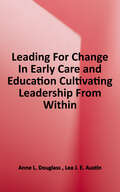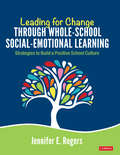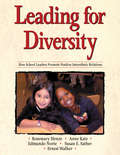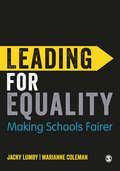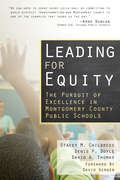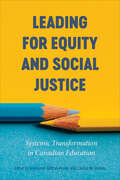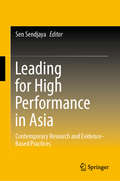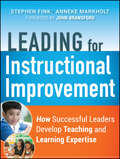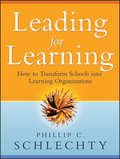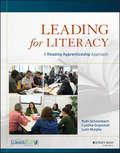- Table View
- List View
Leading Curriculum Development
by Jon W. WilesDevelop a curriculum that can transform an ordinary school into a school of excellence! This resource introduces school leaders to dynamic curriculum leadership and a curriculum development process that leads to highly successful school programs. The author demonstrates how administrators can adapt curriculum to meet their school’s changing needs, incorporate emerging technologies, and reflect new and creative ways of thinking about education.
Leading Dynamic Information Literacy Programs: Best Practices and Stories from Instruction Coordinators
by Anne C. BehlerLeading Dynamic Information Literacy Programs delves into the library instruction coordinator’s work. Each chapter is written by practicing coordinators, who share their experiences leading information literacy programs that are nimble, responsive, and supportive of student learning. The volume discusses the work of instruction coordinators within five thematic areas: Claiming our Space: Library Instruction in the Landscape of Higher Education; Moving and Growing Together; Curriculum Development; Meaningful Assessment; and Leading Change. Readers will gain insight from their colleagues’ advice for situating information literacy within the higher education institution, developing meaningful curricula, and using assessment in productive ways. Many of the stories represent a departure from traditional models of library instruction. In addition, this book is sure to spark inspiration for innovative approaches to program leadership and development, including strategies for growing communities of practice. From leadership skills and techniques, methods for cultivating shared values, pedagogical approaches, team building, assessment strategies – and everything in between – the aspiring or practicing instruction coordinator has much to gain from reading this work.
Leading Dynamic Schools: How to Create and Implement Ethical Policies
by Sharon F Rallis Gretchen B. Rossman Casey D. Cobb Timothy G. Reagan Dr Aaron M. KuntzA practical guide for creating, implementing, and evaluating school policy. This invaluable resource brings to life the process of making and enacting educational policy. The authors present a conceptual framework for developing effective and ethical school policies and help educational leaders evaluate, interpret, and analyze the regulations that govern their schools. Organized by key topics such as English Language Learners, inclusion, and bullying, the text incorporates vignettes, research, and relevant theories to illustrate how readers can: Create a dialogue that represents the needs of all stakeholders Define relevant policies that are ethically sound Integrate legally mandated policies with schoolwide resolutions
The Leading Edge of Early Childhood Education: Linking Science to Policy for a New Generation
by Jacqueline JonesThe Leading Edge of Early Childhood Education aims to support the effort to simultaneously scale up and improve the quality of early childhood education by bringing together relevant insights from emerging research to provide guidance for this critical, fledgling field. It reflects the growing recognition that early childhood experiences have a powerful effect on children&’s later academic achievement and long-term life outcomes. Editors Nonie K. Lesaux and Stephanie M. Jones bring together an impressive array of scholarly contributors. Topics include: · creating learning environments that support children&’s cognitive and emotional development; · identifying and addressing early risk factors; · using data to guide educators&’ practice; and · capitalizing on the use of technology. Recent years have seen a surge of local, state, and national initiatives aimed at expanding and improving early childhood initiatives, particularly regarding access to preK programs. The Leading Edge of Early Childhood Education promises to be a valuable resource for those charged with enacting the next level of work in this critical area.
Leading Effective Secondary School Reform: Your Guide to Strategies That Work
by Mary E. Loughridge Loren R. TarantinoWith this easy-to-use leadership resource, you'll find successful strategies with case studies and sample agendas to help the school change process run smoothly.
Leading English in the Primary School: A Subject Leader's Guide
by Lisa BaldwinLeading English in the Primary School is a comprehensive guide for both aspiring and experienced leaders of primary English. It supports you in navigating your way through the role and offers practical guidance to help you develop a clear understanding of how to improve the teaching of English in your school. Written by experts with extensive experience of both leadership and the primary classroom, it explores skills required for effective subject leadership while continually considering the specific implications for English. With action and reflection points throughout the book, it offers a detailed introduction to: the role of the English subject leader implementing strategy and vision adapting to new educational policy methods for leading teaching and learning how and why leaders evaluate and monitor progress contemporary changes to the curriculum. Rich case studies reveal how schools lead English in practice and provide real-life examples of English subject leaders’ decision-making processes and actions. Grounding the subject leader role in the current curriculum, Leading English in the Primary School is a source of advice, support and inspiration for all professionals embracing the complex, challenging, yet fulfilling role of Primary English Leader.
Leading Equity-Based MTSS for All Students
by Amy McCart Dr. Dawn Dee MillerEnsure that Every Child Achieves Academic and Social Success An equity-based multi-tiered system of support (MTSS) helps school teams engage all students across the full range of learning needs. MTSS ensures that the vision of equity for every student is achieved, with high expectations and quality instruction, while not straining a school&’s budget or personnel. This strategy filled book teaches you how to • Engage all students in learning through an equity-based approach • Analyze and utilize your resources • Apply strengths- and evidence-based principles for implementation • Incorporate effective tools to systematize MTSS
Leading Equity-Based MTSS for All Students
by Amy McCart Dr. Dawn Dee MillerEnsure that Every Child Achieves Academic and Social Success An equity-based multi-tiered system of support (MTSS) helps school teams engage all students across the full range of learning needs. MTSS ensures that the vision of equity for every student is achieved, with high expectations and quality instruction, while not straining a school&’s budget or personnel. This strategy filled book teaches you how to • Engage all students in learning through an equity-based approach • Analyze and utilize your resources • Apply strengths- and evidence-based principles for implementation • Incorporate effective tools to systematize MTSS
Leading Every Day: Actions for Effective Leadership
by Dr Joyce S. Kaser Ms Susan E. Mundry Katherine E. Stiles Susan Loucks-HorsleyYour shortcut to success for inspired school leadership! Tap your greatest leadership potential and quickly get on track to meeting today’s complicated challenges with this follow up to the best-selling Learning Forward Book of the Year. Newly updated and revised, these short, inspiration-infused nuggets of actionable advice provide a path to effective leadership for all. New features include: Newly added Book 5, focused on solid data systems and achievable results Over 150 convenient, closely integrated daily contemplations to carry anywhere Succinct, up-to-date research for creative solutions to leadership challenges, change, and professional development Updated references and quotes
Leading for All: How to Create Truly Inclusive and Excellent Schools
by Jennifer Spencer-Iiams Josh FlosiDevelop inclusive and equitable school communities where all learners thrive Research has shown that inclusive education results in better academic outcomes for ALL students, not just those identified with disabilities, by promoting self-efficacy, improving social and emotional health, and consistently implementing research-based instructional strategies. Still, many schools rely on deeply ingrained, segregated practices that fail to serve all students. Leading for All is a practical guide that provides a clear pathway for educators to develop a more inclusive school community from start to finish. Authors Jennifer Spencer-Iiams and Josh Flosi share lessons learned from spending nearly a decade building district schools where all students are served in their neighborhood school and in classrooms with their general education peers. Features include: Three focus areas to guide change: Creating Inclusive Cultures, Improving Instructional Practices, and Increasing Student Voice 7 Components of Inclusive and Equitable Learning Communities Supporting resources for promoting inclusion throughout the school day, including co-curricular activities and transportation Stories of real students and teachers and the actions that impacted their success Educators and school leaders want to create inclusive and excellent educational experiences for all students, but they do not always know how to proceed. Leading for All provides a model, stories, strategies, and clear evidence that it can be done effectively.
Leading for All: How to Create Truly Inclusive and Excellent Schools
by Jennifer Spencer-Iiams Josh FlosiDevelop inclusive and equitable school communities where all learners thrive Research has shown that inclusive education results in better academic outcomes for ALL students, not just those identified with disabilities, by promoting self-efficacy, improving social and emotional health, and consistently implementing research-based instructional strategies. Still, many schools rely on deeply ingrained, segregated practices that fail to serve all students. Leading for All is a practical guide that provides a clear pathway for educators to develop a more inclusive school community from start to finish. Authors Jennifer Spencer-Iiams and Josh Flosi share lessons learned from spending nearly a decade building district schools where all students are served in their neighborhood school and in classrooms with their general education peers. Features include: Three focus areas to guide change: Creating Inclusive Cultures, Improving Instructional Practices, and Increasing Student Voice 7 Components of Inclusive and Equitable Learning Communities Supporting resources for promoting inclusion throughout the school day, including co-curricular activities and transportation Stories of real students and teachers and the actions that impacted their success Educators and school leaders want to create inclusive and excellent educational experiences for all students, but they do not always know how to proceed. Leading for All provides a model, stories, strategies, and clear evidence that it can be done effectively.
Leading for Change: Race, intimacy and leadership on divided university campuses (Routledge Research in Educational Leadership)
by Jonathan JansenThis book offers new theoretical ground for thinking about, and transforming, leadership and higher education worldwide. Through an examination of the construct of intimacy and ‘nearness’, including emotional, spiritual, psychic, intellectual, and physical closeness, Jonathan Jansen demonstrates its power to influence positive leadership in young people. He argues that sensory leadership, which includes but extends beyond the power of touch, represents a fresh and effective approach to progressive transformation of long divided institutions. Considering richly textured narratives, chapters explore complex intimacies among Black and White university students in South Africa, post-apartheid and in the aftermath of a major racial atrocity. The stories reveal the students’ transformation in the process of ‘leadership for change’, interweaving concepts of racism, human relationships and intimacy, and in turn expanding the knowledge base of social and institutional improvement. This book explores how, when different kinds of nearness come together in leadership change, young people respond in ways that would not be possible through conventional instruments such as policy, legislation and the appeal to moral sensibilities alone. Leading for Change will be critical reading for academics, researchers and postgraduate students in the fields of education, educational justice, higher education, educational leadership and change, social and/or racial justice. This book will also be of interest to those working in the fields of anthropology, social psychology, and South African contemporary politics, policy and institutional practices.
Leading for Change in Early Care and Education: Cultivating Leadership from Within (Early Childhood Education Ser.)
by Anne L. DouglassFeaturing both research findings and practical recommendations, this book presents an innovative framework for nurturing leadership in the care and education of young children. Early educators are often seen as the objects of change, rather than the architects and co-creators of change. Douglass calls for a paradigm shift in thinking that challenges many long-held stereotypes about the early care and education workforce's capacity to lead change. Case studies show how educators use their expertise every day to make a difference in the lives of children and families. These accounts demonstrate concrete strategies for expanding current thinking about who can be leaders for change and for developing more inclusive pathways for leadership. This book has the potential to revolutionize the field with a new model for developing and nurturing innovative, entrepreneurial, and skilled early educator leaders capable of driving transformative change-from classrooms and home-based programs to communities and beyond. Includes a cross-disciplinary examination of leadership, improvement, and innovation, a framework for building ecosystems that supports professional growth and teacher retention, case studies that reveal immense untapped potential from within the early care and education workforce, and a critical look at the current state of leadership and quality improvement in early childhood education.
Leading for Change Through Whole-School Social-Emotional Learning: Strategies to Build a Positive School Culture
by Jennifer E RogersDevelop and cultivate a positive school culture! Calling all change agents! If you are hoping to join other schools and districts across the country that are adopting Social-Emotional Learning (SEL) programs and practices to improve student outcomes and teacher capacity, then you’ve found the right book. Let Jennifer Rogers share her specialized experience in developing and implementing behavioral and social-emotional programs and support with you. The practical framework outlined in this book comprises real-world experiences and evidence-based strategies to integrate systemic change toward a positive school culture. With sustainable practices in mind, this guide features thought-provoking worksheets to explore staff understanding of SEL, collect evidence, influence instruction, and more a step-by-step rubric to guide implementation with recommendations resources to explore at the end of each chapter reflection questions to promote deeper thinking SEL is about both prevention and intervention. For the stakeholders engaged in this work who must think reflectively about schools, this book offers the support, strategies, processes, and tools, to teach students these competencies in a comprehensive and sustainable way.
Leading for Change Through Whole-School Social-Emotional Learning: Strategies to Build a Positive School Culture
by Jennifer E RogersDevelop and cultivate a positive school culture! Calling all change agents! If you are hoping to join other schools and districts across the country that are adopting Social-Emotional Learning (SEL) programs and practices to improve student outcomes and teacher capacity, then you’ve found the right book. Let Jennifer Rogers share her specialized experience in developing and implementing behavioral and social-emotional programs and support with you. The practical framework outlined in this book comprises real-world experiences and evidence-based strategies to integrate systemic change toward a positive school culture. With sustainable practices in mind, this guide features thought-provoking worksheets to explore staff understanding of SEL, collect evidence, influence instruction, and more a step-by-step rubric to guide implementation with recommendations resources to explore at the end of each chapter reflection questions to promote deeper thinking SEL is about both prevention and intervention. For the stakeholders engaged in this work who must think reflectively about schools, this book offers the support, strategies, processes, and tools, to teach students these competencies in a comprehensive and sustainable way.
Leading for Diversity: How School Leaders Promote Positive Interethnic Relations
by Rosemary C. Henze Mr Edmundo Norte Dr Susan E. Sather Ernest Walker Dr Anne KatzThe authors provide powerful models of leadership that are effective in developing schools where positive interethnic relations can flourish.
Leading for Equality: Making Schools Fairer
by Dr Marianne Coleman Professor Jacky LumbyDisentangling the concept of equality in schools can be a tricky task for those in senior, middle or classroom leadership. This book will unpack ideas of equality, equity, diversity and social justice, providing practitioners and those training to teach with an understanding of equality in order to address educational values and practice. Drawing on a wide range of case studies from schools in England, Wales and Scotland, the authors illustrate the importance of leading for equality with a clear and proactive vision for change. The authors explore these key areas: · Socio-economic class · Gender · Sexuality · Ethnicity · Religion · Migrant children · Special learning needs and disabilities This book will serve as a handy guide for postgraduate and undergraduate students on Education Leadership and Inclusive Education courses.
Leading for Equality: Making Schools Fairer
by Professor Jacky Lumby Marianne ColemanDisentangling the concept of equality in schools can be a tricky task for those in senior, middle or classroom leadership. This book will unpack ideas of equality, equity, diversity and social justice, providing practitioners and those training to teach with an understanding of equality in order to address educational values and practice. Drawing on a wide range of case studies from schools in England, Wales and Scotland, the authors illustrate the importance of leading for equality with a clear and proactive vision for change. The authors explore these key areas: Socio-economic class Gender Sexuality Ethnicity Religion Migrant children Special learning needs and disabilities This book will serve as a handy guide for postgraduate and undergraduate students on Education Leadership and Inclusive Education courses.
Leading for Equity: The Pursuit of Excellence in the Montgomery County Public Schools
by Stacey M. Childress Denis P. Doyle David A. ThomasLeading for Equity tells the compelling story of the Montgomery County (Maryland) Public Schools and its transformation—in less than a decade—into a system committed to breaking the links between race and class and academic achievement. In chapters organized around six core themes, the authors lay out the essential elements of MCPS&’s success. They identify key lessons other districts can draw from MCPS&’s experience and offer a framework for applying them. A dramatic departure from &“business as usual,&” MCPS has won nationwide attention as a compelling model for tackling the achievement and opportunity issues that confront our nation as a whole.
Leading for Equity: The Pursuit of Excellence in the Montgomery County Public Schools
by David A. Thomas David Gergen Stacey M. Childress Denis P. DoyleLeading for Equity tells the compelling story of the Montgomery County (Maryland) Public Schools and its transformation--in less than a decade--into a system committed to breaking the links between race and class and academic achievement. In chapters organized around six core themes, the authors lay out the essential elements of MCPS's success. They identify key lessons other districts can draw from MCPS's experience and offer a framework for applying them. A dramatic departure from "business as usual," MCPS has won nationwide attention as a compelling model for tackling the achievement and opportunity issues that confront our nation as a whole.
Leading for Equity and Social Justice: Systemic Transformation in Canadian Education
by Andréanne Gélinas-Proulx Carolyn M. ShieldsEducational institutions, and in particular educational leaders, play critical roles in identifying and rectifying the many inequities that oppress, marginalize, and exclude individual students, educational actors, and some minoritized groups in Canadian education. Leading for Equity and Social Justice provides a deep look at some of these inequities and injustices and offers transformative leadership as one way for leaders to stimulate, support, and foster equitable and socially just practices in educational institutions. This collection emphasizes the systemic nature of inequality and supports the necessity of systemic change to target not only individuals but also structures, policies, and far-reaching practices. Focusing on various marginalized groups – including the Indigenous community, LGBTQ2S+ peoples, refugees, newcomers, and specific groups of teachers – chapters explore transformative leadership in practice and how to achieve inclusion, respect, and excellence in schools. Arguing that leadership involves much more than simply putting policy into practice, Leading for Equity and Social Justice promotes the need for leaders to recognize their role as advocates and activists.
Leading for High Performance in Asia: Contemporary Research and Evidence-Based Practices
by Sen SendjayaHow do leaders lead for high performance in Asia, the fastest growing region in the world? What are the new leadership influential processes and skillsets needed to engage the organizational members in creative and meaningful ways? In this book, readers will find strategic insights and tips derived from cutting-edge studies on specific leadership and management issues in Asia. Using a range of methodologies from in-depth interviews, field surveys, and computer simulation, the studies include the following topics: Strategies to foster citizenship and pro-social behaviors in high-performing firms; the roles of culture-specific values such as paternalism and collectivism, the construction of leader identity, the effects of leadership on team satisfaction, the development of female leaders, and key lessons in strategic leadership development. Featuring studies conducted in China, Indonesia, Singapore, and Australia, this book will equip readers with a set of strategic and actionable tools for tackling the leadership challenges in Asia. Further, each chapter includes a ‘Managerial Implications’ section, in which subject experts share evidence-based practical and contextual recommendations.
Leading for Instructional Improvement
by Stephen Fink Anneke MarkholtThere is little agreement among school leaders on what constitutes quality teaching and how best to support teachers in improving lessons, assessments, and classroom instruction. This book will show how principals and other school leaders can 'grow' the expertise of teachers to deliver high quality instruction that serves all students well. It introduces principals to a five-part model of effective instruction. It then shows leaders how to make use of this framework for guiding new and veteran teachers on improving lessons, instruction, and other aspects of classroom practices.
Leading for Learning
by Phillip C. SchlechtyWritten by acclaimed school reform advocate Phillip C. Schlechty, Leading for Learning offers educators the framework, tools, and processes they need to transform their schools from bureaucracies into dynamic learning organizations. Schlechty explains how to move beyond some of the deeply ingrained and negative conceptions of schooling that guide so much of their practice. He shows educators how they can take advantage of new learning technologies by increasing their organization's capacity to support continuous innovation."Clearly not for the fainthearted, Schlechty's engrossing appraisal of American education calls for a bold, truly fundamental transformation of how we run our public schools. Some books are thought-provoking; this one is action-provoking." -W. James Popham, professor emeritus, UCLA"Dr. Schlechty has once again written an insightful book that educational leaders can use as a road map in transforming our schools into learning organizations designed to serve twenty-first century students." -Dr. Randy Bridges, superintendent, Alamance-Burlington School System, NC"Because education is ultimately a community responsibility, Schlechty's proposal to shift school systems from bureaucracies to learning organizations can open doors to citizens who are frustrated by the bureaucracy in their efforts to reclaim their role in education. This book is as much for them as it is for professional educators." -David Mathews, president, Kettering Foundation"Anyone in a school leadership position-from the board room to the classroom-should read this engaging and thought-provoking book. It's a must?-read for all immersed in or contemplating the transformation of public education." - Claudia Mansfield Sutton, chief communications and marketing officer, American Association of School Administrators
Leading for Literacy: A Reading Apprenticeship Approach
by Cynthia Greenleaf Lynn Murphy Ruth SchoenbachClear, on-the-ground guidance for Reading Apprenticeship implementation Leading for Literacy provides tools and real-life examples to expand the benefits of a literacy approach that sparks students' engaged reading and thinking across disciplines, from middle school through community college. A companion to the landmark Reading for Understanding, this book guides teachers, leaders, and administrators through the nuts, bolts, benefits, and stumbling blocks of creating Reading Apprenticeship communities that extend a culture of literacy beyond individual classrooms. This book explains how to generate authentic buy-in from teachers and administrators, use the Reading Apprenticeship Framework to turn reform overload into reform coherence, and create literacy teams, professional learning communities, and Reading Apprenticeship communities of practice that sustain an institutional focus on a student-centered, strengths-based culture of literacy. Key insights from Reading Apprenticeship practitioners across the country address how to get started, build momentum, assess progress, and build partnerships and networks across schools, districts, campuses, and regions. Persistently low levels of adolescent literacy continue to short-change students, contribute to discredited high school diplomas, and cause millions of students to drop out of high school and community college. Forty percent or more of community college students require remedial reading courses as college freshman. The researchers at WestEd's Strategic Literacy Initiative developed the Reading Apprenticeship Framework to provide educators with a proven path to improving literacy for all students, and this book provides clear guidance on bringing the framework to life. How to integrate Reading Apprenticeship with existing reform efforts How to use formative assessment to promote teacher and student growth How to coach and empower teachers How to cultivate literacy leadership How to provide long-term support for a strong content-literacy program Nationwide classroom testing has shown Reading Apprenticeship to promote not only literacy and content knowledge, but also motivation and positive academic identity--leading to better student outcomes that reach beyond the classroom walls. Leading for Literacy lays out compelling ways to spread the benefits of Reading Apprenticeship, with practical guidance and real-world insight.
